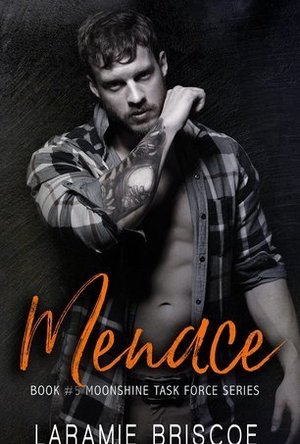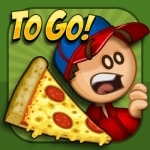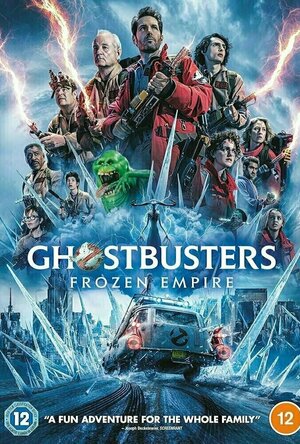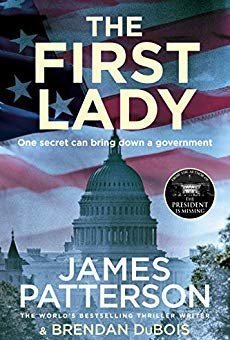Search
Search results

Menace (Moonshine Task Force #5)
Book
Mason “Menace” Harrison “Single and ready to mingle……” Those are the words above...
DaveySmithy (107 KP) rated Ghostbusters: Frozen Empire (2024) in Movies
Dec 4, 2024 (Updated Dec 4, 2024)
Fun moments
I went into Ghostbusters: Frozen Empire (2024) hoping it would build on the promise of Ghostbusters: Afterlife while carving out its own icy identity. Unfortunately, while the film has its moments of charm and spectacle, it left me feeling cold overall—pun intended.
The premise is intriguing: a mysterious, apocalyptic winter descending on New York City, with the Ghostbusters tasked to save the day. The visuals are striking—snow-covered cityscapes and frost-bitten ghosts make for some memorable scenes. The effects team clearly had a blast imagining what a frozen supernatural invasion would look like, and the frosty atmosphere feels like a fresh twist for the franchise.
The returning cast, especially Paul Rudd and Carrie Coon, are as likable as ever, but they’re not given much to do beyond reacting to the chaos. The younger characters, led by Mckenna Grace, are still charming, but the novelty of their “kid Ghostbusters” dynamic is starting to wear thin. The humor is hit-or-miss; while there are a few clever lines and fun moments, some of the jokes feel too forced, as though the film is trying too hard to mimic the original’s effortless wit.
One of the biggest disappointments for me was the pacing. The first half of the movie drags, spending too much time on exposition and setup without giving us the action or scares we came for. When the ghost-busting finally ramps up, it’s exciting, but it feels rushed and formulaic. The climactic battle is visually impressive but lacks emotional weight, relying more on spectacle than storytelling.
I also couldn’t help but feel that Frozen Empire leans too heavily on nostalgia. The callbacks to the original movies are fun at first, but they start to feel like a crutch, reminding us of the franchise’s glory days instead of moving it forward in a meaningful way.
Overall, Ghostbusters: Frozen Empire is a decent popcorn flick with some cool visuals and a few laughs, but it doesn’t live up to the potential of its concept or its legacy. It’s a 6/10 for me—fun in the moment, but not particularly memorable.
The premise is intriguing: a mysterious, apocalyptic winter descending on New York City, with the Ghostbusters tasked to save the day. The visuals are striking—snow-covered cityscapes and frost-bitten ghosts make for some memorable scenes. The effects team clearly had a blast imagining what a frozen supernatural invasion would look like, and the frosty atmosphere feels like a fresh twist for the franchise.
The returning cast, especially Paul Rudd and Carrie Coon, are as likable as ever, but they’re not given much to do beyond reacting to the chaos. The younger characters, led by Mckenna Grace, are still charming, but the novelty of their “kid Ghostbusters” dynamic is starting to wear thin. The humor is hit-or-miss; while there are a few clever lines and fun moments, some of the jokes feel too forced, as though the film is trying too hard to mimic the original’s effortless wit.
One of the biggest disappointments for me was the pacing. The first half of the movie drags, spending too much time on exposition and setup without giving us the action or scares we came for. When the ghost-busting finally ramps up, it’s exciting, but it feels rushed and formulaic. The climactic battle is visually impressive but lacks emotional weight, relying more on spectacle than storytelling.
I also couldn’t help but feel that Frozen Empire leans too heavily on nostalgia. The callbacks to the original movies are fun at first, but they start to feel like a crutch, reminding us of the franchise’s glory days instead of moving it forward in a meaningful way.
Overall, Ghostbusters: Frozen Empire is a decent popcorn flick with some cool visuals and a few laughs, but it doesn’t live up to the potential of its concept or its legacy. It’s a 6/10 for me—fun in the moment, but not particularly memorable.

Papa's Pizzeria To Go!
Games
App
Things get messy when you’re stuck running a wildly popular pizza parlor in Papa’s Pizzeria To...
Kristy H (1252 KP) rated Carefully Everywhere Descending in Books
Feb 13, 2018
Audrey Anderson is a bright student from a low income family. Audrey spends most of her time focused on school, with college as her ultimate goal. While she's close to her best friend, she isn't that involved with other kids at her school. However, when one of the most popular (and beautiful) girls in school, Scarlett, asks Audrey to tutor her in English, Audrey finds herself caught up in the typical drama of high school - friendship, prom, etc.
Okay, first of all, I probably bumped up this rating a bit because it was just so refreshing to read a YA LGBT novel with a nice, normal protagonist who seemed real. Most of Audrey's friends and family seem fine with her sexuality and other girls at her school go to prom together. It's wonderful to see a LGBT book where the character's sexuality is just part of her life, versus what drives the entire plot.
The book also does a good job of portraying Audrey and Scarlett's romance - Audrey's unrequited love for Scarlett seemed a bit much at first, but remembering back to the angst of teen love, it seemed right on point.
My problem with this book was some of its odd plot twists, which really didn't seem necessary. I won't spoil the book here, but I think Bedford could have stuck with Audrey and Scarlett's love story and been just fine. That being said, I didn't think they were that crazy or out of left field. I found Audrey to be a compelling and realistic character and it was great to see an author use a YA protagonist from a low income background, even if it did seem a bit overused at times. Too often these books focus on the popular kids, driving their parents' cars and living life without a care in the world. Audrey's life is probably far more realistic for many.
Frankly, the book had some holes and issues, but it was still worth the read for its portrayal of a real YA lesbian relationship and Audrey's overall situation. I enjoyed her character and read the entire book in one day - I'll certainly be recommending it to several of my friends.
(I received an ARC of this novel from Netgalley in return for an unbiased review.)
Okay, first of all, I probably bumped up this rating a bit because it was just so refreshing to read a YA LGBT novel with a nice, normal protagonist who seemed real. Most of Audrey's friends and family seem fine with her sexuality and other girls at her school go to prom together. It's wonderful to see a LGBT book where the character's sexuality is just part of her life, versus what drives the entire plot.
The book also does a good job of portraying Audrey and Scarlett's romance - Audrey's unrequited love for Scarlett seemed a bit much at first, but remembering back to the angst of teen love, it seemed right on point.
My problem with this book was some of its odd plot twists, which really didn't seem necessary. I won't spoil the book here, but I think Bedford could have stuck with Audrey and Scarlett's love story and been just fine. That being said, I didn't think they were that crazy or out of left field. I found Audrey to be a compelling and realistic character and it was great to see an author use a YA protagonist from a low income background, even if it did seem a bit overused at times. Too often these books focus on the popular kids, driving their parents' cars and living life without a care in the world. Audrey's life is probably far more realistic for many.
Frankly, the book had some holes and issues, but it was still worth the read for its portrayal of a real YA lesbian relationship and Audrey's overall situation. I enjoyed her character and read the entire book in one day - I'll certainly be recommending it to several of my friends.
(I received an ARC of this novel from Netgalley in return for an unbiased review.)
Whatchareadin (174 KP) rated The First Lady in Books
Aug 8, 2019
It's four weeks until the election for the new President. Current President Tucker is enjoying himself at a hotel in Atlanta with his girlfriend, while his wife and first lady, Grace Tucker, is fulfilling the duties of her office. When the President leave the hotel with his mistress, all hell breaks loose. There are reporters everywhere, there to catch the scandal. It's all just too much for the First Lady to handle, so she retreats to one of her favorite places and then, she turns up missing. Sally Grissom is the Secret Service Agent in charge of the presidential detail and doesn't know how the First Lady going missing isn't something she is told. Until she is called into the President's office and is asked to look for her secretively. What is going on? Something isn't right. And Sally has her eye on the President's Chief of Staff and his strange request. But Sally doesn't work for him, she serves the Office of the President and she will find the First Lady, no matter what.
This is a book I really enjoyed. It captured my attention from the start and had some twists and turns, I didn't see coming. There was only one drawback from this audio version of the book, the narrator. She did a fine job of reading the story and the voices, but her pronunciation drove me crazy. If you're not from the Washington, DC area, you might not notice, but it is so obvious. Pronouncing Maryland like Merry-Land. Potomac like Pot A Mack, and Arapaho like Air a pay ho. I cringed every time.
Imagine in this day and time with smart phones everywhere if the First Lady went missing. It would be all over the news. Why doesn't the Chief of Staff want to share this with the world, to help find her? Why isn't the FBI involved? Something is going on in the White House and Sally doesn't know if the President is aware at all. Or is his mistress and the election much more important to him than finding his wife.
Sally is going to do all she can to do her job even when she is asked to stand down. Even when it seems like there is always an obstacle there to stop her. Will she find the First Lady before it's too late? You'll have to read the book to find out.
This is a book I really enjoyed. It captured my attention from the start and had some twists and turns, I didn't see coming. There was only one drawback from this audio version of the book, the narrator. She did a fine job of reading the story and the voices, but her pronunciation drove me crazy. If you're not from the Washington, DC area, you might not notice, but it is so obvious. Pronouncing Maryland like Merry-Land. Potomac like Pot A Mack, and Arapaho like Air a pay ho. I cringed every time.
Imagine in this day and time with smart phones everywhere if the First Lady went missing. It would be all over the news. Why doesn't the Chief of Staff want to share this with the world, to help find her? Why isn't the FBI involved? Something is going on in the White House and Sally doesn't know if the President is aware at all. Or is his mistress and the election much more important to him than finding his wife.
Sally is going to do all she can to do her job even when she is asked to stand down. Even when it seems like there is always an obstacle there to stop her. Will she find the First Lady before it's too late? You'll have to read the book to find out.

Spotted - meet, chat, date
Social Networking and Lifestyle
App
With over 3 million crossed paths every day, Spotted is YOUR app to connect with people you...
BankofMarquis (1832 KP) rated The Irishman (2019) in Movies
Nov 30, 2019
Delivers What Is Expected
Like eating comfort food on a cold, wintery day, sitting down to catch the latest Scorsese/DeNiro mob movie filled me with a warmth that was satisfying for it's familiarity. It is a film landscape mined by professionals who know this genre of movie well.
There is a terrific film in this 3 1/2 hour epic - if only "Marty" would have trimmed the fat to find it.
Telling the real-life story (with some conjecture and fabrications), THE IRISHMAN tells the tale of...well...Irishman Frank Sheeran (Robert DeNiro) a working stiff who rises in the ranks of mobster Russell Buffalino (Joe Pesci) to be one of his chief enforcers and the personal bodyguard to Jimmy Hoffa (Al Paciino).
In the lead, DeNiro commands the screen like the DeNiro of old. His Frank Sheeran is menacing, razor-focused on his objectives. You never question Frank's loyalties and his ability to keep silent. DeNiro shows this by be being silent for a good part of this film, even though he is on screen for most of it. He is a commanding force that requires that we pay attention to him.
It was good to see Pesci back onscreen as Russell Buffalino. His mob boss is pragmatic, making decisions sternly and expecting his people to follow them, no questions asked. His presence on the screen is almost as commanding as DeNiro's and I wouldn't be surprised to see DeNiro (Best Actor) and Pesci (Best Supporting Actor) be in the mix come Oscar time.
In lesser, (almost cameo), roles - but faring very well - is a "who's who" of character actors, Harvey Keitel (who I would have LOVED to have seen much, much more in this film), Ray Romano, Bobby Canavale, Jesse Pleimens and Anna Paquin, I'm sure all jumped at the chance to appear - however briefly - in a Scorsese mob epic.
Faring less well in this film is Al Pacio as Jimmy Hoffa. He is back to his "yelling Al Pacino" ways of films like SCENT OF A WOMAN. His Hoffa is pretty one note and, consequently, his scenes with DeNiro are ineffective mostly because Pacino is chewing up the scenery (and yelling) while DeNiro is sitting silent and staring and listening to Pacino. This was a major disappointment for me, but (fortunately), Hoffa is in only about 1/3 of this long film, so while it hampered my enjoyment of the film, it didn't ruin it.
Credit (and blame) for all of this goes to master Director Martin Scorsese who has mined these waters more successfully in CASINO, THE DEPARTED and GOODFELLAS (his best film, IMO). This film is a loving pastiche to these types of films and a bygone era - and he chose to make it for NETFLIX for he wanted to make a sprawling epic and take his time in telling the story he wanted to tell. This is evidenced in the 3 1/2 hour length of this film, which if filled with long tracking shots set to a backdrop of Italian crooners singing old standards. It's a throwback to a different time and place, one that these players know well.
Scorsese has stated the he only decided to make this film because the "de-aging" software the he used to make DeNiro and Pesci look 30 years younger was "good enough" to use. And I would agree with that statement. The de-aging of these 2 (and others) is "good enough", in some scenes I forgot I was watching a de-aged DeNiro and Pesci, while in some other scenes, I could spot the trick. Again, it was "good enough" and not distracting (unless you were looking to make it distracting, then you probably found what you were looking for).
But for me - a fan of these types of films, I was not disappointed. It was about what I expected it to be. If you were looking for something different and new, look elsewhere, you will be disappointed.
Letter Grade: B+
8 stars (out of 10) and you can take that to the Bank(OfMarquis)
There is a terrific film in this 3 1/2 hour epic - if only "Marty" would have trimmed the fat to find it.
Telling the real-life story (with some conjecture and fabrications), THE IRISHMAN tells the tale of...well...Irishman Frank Sheeran (Robert DeNiro) a working stiff who rises in the ranks of mobster Russell Buffalino (Joe Pesci) to be one of his chief enforcers and the personal bodyguard to Jimmy Hoffa (Al Paciino).
In the lead, DeNiro commands the screen like the DeNiro of old. His Frank Sheeran is menacing, razor-focused on his objectives. You never question Frank's loyalties and his ability to keep silent. DeNiro shows this by be being silent for a good part of this film, even though he is on screen for most of it. He is a commanding force that requires that we pay attention to him.
It was good to see Pesci back onscreen as Russell Buffalino. His mob boss is pragmatic, making decisions sternly and expecting his people to follow them, no questions asked. His presence on the screen is almost as commanding as DeNiro's and I wouldn't be surprised to see DeNiro (Best Actor) and Pesci (Best Supporting Actor) be in the mix come Oscar time.
In lesser, (almost cameo), roles - but faring very well - is a "who's who" of character actors, Harvey Keitel (who I would have LOVED to have seen much, much more in this film), Ray Romano, Bobby Canavale, Jesse Pleimens and Anna Paquin, I'm sure all jumped at the chance to appear - however briefly - in a Scorsese mob epic.
Faring less well in this film is Al Pacio as Jimmy Hoffa. He is back to his "yelling Al Pacino" ways of films like SCENT OF A WOMAN. His Hoffa is pretty one note and, consequently, his scenes with DeNiro are ineffective mostly because Pacino is chewing up the scenery (and yelling) while DeNiro is sitting silent and staring and listening to Pacino. This was a major disappointment for me, but (fortunately), Hoffa is in only about 1/3 of this long film, so while it hampered my enjoyment of the film, it didn't ruin it.
Credit (and blame) for all of this goes to master Director Martin Scorsese who has mined these waters more successfully in CASINO, THE DEPARTED and GOODFELLAS (his best film, IMO). This film is a loving pastiche to these types of films and a bygone era - and he chose to make it for NETFLIX for he wanted to make a sprawling epic and take his time in telling the story he wanted to tell. This is evidenced in the 3 1/2 hour length of this film, which if filled with long tracking shots set to a backdrop of Italian crooners singing old standards. It's a throwback to a different time and place, one that these players know well.
Scorsese has stated the he only decided to make this film because the "de-aging" software the he used to make DeNiro and Pesci look 30 years younger was "good enough" to use. And I would agree with that statement. The de-aging of these 2 (and others) is "good enough", in some scenes I forgot I was watching a de-aged DeNiro and Pesci, while in some other scenes, I could spot the trick. Again, it was "good enough" and not distracting (unless you were looking to make it distracting, then you probably found what you were looking for).
But for me - a fan of these types of films, I was not disappointed. It was about what I expected it to be. If you were looking for something different and new, look elsewhere, you will be disappointed.
Letter Grade: B+
8 stars (out of 10) and you can take that to the Bank(OfMarquis)
365Flicks (235 KP) rated Ice Guardians (2016) in Movies
Nov 20, 2019
Speaking from my own personal perspective, Ice Guardians is one of the most interesting gripping documentary’s I have watched recently. Full Disclosure first… I am a Brit, a little Englander if you will so my knowledge of Ice Hockey and the world of that sport is very limited to the Mighty Ducks movies. However I love a good personal Documentary that can engage me in something I know little about. Ice Guardians covers that for me so lets do this.
Director Brett Harvey carefully and passionately explores one of the most controversial and provocative positions in the history the National Hockey League, the Enforcer.
This movie is the Story of the most controversial positions in the world of sport, from its birth (out of little policing by the refs in the game) to today. ‘The Enforcer’ this is a position that has been talked about through the decades. Is it needed? Is it Necessary? Who the hell would take this role in a game of Ice Hockey?. Essentially the role is to be an “Ice Boxer” hit harder and faster than the guy on the opposite side, be such a menace that everyone on your team is safe because the opposition are scared Shit-less to start something because you will get them.
Of course my simplistic analysis above is that of a man before watching this movie. Watch as giants of the game and some of the hardest son of bitches in the position, strip everything back to bare all on the role they play, why they play it and the sheer scrutiny they are are faced with on a day to day basis. I will honestly say I was moved by this Documentary at times, these men are looked at like caged beasts, Unhinged if you want. However these men are exactly that ‘MEN’ with more Honor, Integrity and way more Loyalty than most Sportsmen.
Written by Harvey and Scott Dodds, the film features interviews with NFL greats such as Dave “The Hammer” Schultz, Clark Gillies and Dave Semenko.
We at 365 Highly recommend this Documentary and hope you will it a chance because it is engaging as hell and gives you a deep insight into the role of the Enforcer from the Enforcers point of view. Its not as black and white as you may think and I truly think you will take something away to think from this flick.
I want you all to watch this movie its wonderfully made and deals with a subject like this carefully and with the respect it deserves.
Director Brett Harvey carefully and passionately explores one of the most controversial and provocative positions in the history the National Hockey League, the Enforcer.
This movie is the Story of the most controversial positions in the world of sport, from its birth (out of little policing by the refs in the game) to today. ‘The Enforcer’ this is a position that has been talked about through the decades. Is it needed? Is it Necessary? Who the hell would take this role in a game of Ice Hockey?. Essentially the role is to be an “Ice Boxer” hit harder and faster than the guy on the opposite side, be such a menace that everyone on your team is safe because the opposition are scared Shit-less to start something because you will get them.
Of course my simplistic analysis above is that of a man before watching this movie. Watch as giants of the game and some of the hardest son of bitches in the position, strip everything back to bare all on the role they play, why they play it and the sheer scrutiny they are are faced with on a day to day basis. I will honestly say I was moved by this Documentary at times, these men are looked at like caged beasts, Unhinged if you want. However these men are exactly that ‘MEN’ with more Honor, Integrity and way more Loyalty than most Sportsmen.
Written by Harvey and Scott Dodds, the film features interviews with NFL greats such as Dave “The Hammer” Schultz, Clark Gillies and Dave Semenko.
We at 365 Highly recommend this Documentary and hope you will it a chance because it is engaging as hell and gives you a deep insight into the role of the Enforcer from the Enforcers point of view. Its not as black and white as you may think and I truly think you will take something away to think from this flick.
I want you all to watch this movie its wonderfully made and deals with a subject like this carefully and with the respect it deserves.
Chris Sawin (602 KP) rated Cop Out (2010) in Movies
Jun 22, 2019 (Updated Jun 23, 2019)
Jimmy Monroe (Bruce Willis) and Paul Hodges (Tracy Morgan) have been working as partners at the NYPD for the past nine years. They have a reputation at the precinct for doing things their own sporadic and wreckful way that isn't normal procedure and usually winds up getting them into hot water with the captain. A suspect is brought in for interrogation and when he finally spills the beans on a drug deal happening that afternoon, Jimmy and Paul think it's best to act on it right then and there. After their plan fails, their suspect is killed and months of work is flushed down the drain. Jimmy and Paul are suspended for 30 days without pay, which isn't good news for Jimmy since his daughter is getting married and has the typical expensive wedding of her dreams in mind. Jimmy plans on selling a collectible baseball card that could pay for his daughter's wedding and then some, but the card is stolen by some crackheads before he can get the chance. Now Jimmy's just trying to get the card back to pay for his daughter's wedding, but him and Paul, who's too distracted with his wife's possible infidelity to really concentrate on the task at hand, are thrown into something much deeper.
To tell the truth, I wasn't looking forward to this film at all. I'm a pretty big fan of most of Kevin Smith's work, but he didn't write the film. It could be argued that he did write Jersey Girl and that could be considered a bomb, but his films usually average about $25-$30 million anyway. A Kevin Smith film isn't really about bringing in a large amount of money at the box office. His charm is in his writing, especially the dialogue and interaction between characters. There's a very specific audience his films will appeal to and none of them have really branched away from that. But him not writing this one made me think, "Eh. Not sure what that'll be like since he didn't write it." When it comes to Bruce Willis, I've never talked to anyone who dislikes him entirely. There always seems to be at least one of his films everybody enjoys. Die Hard, The Fifth Element, and Sin City are just a few off the top of my head. The real buzz-killer for me though was Tracy Morgan. He's just never been funny to me. He was beyond lame on Saturday Night Live and 30 Rock has never been able to hold my attention for very long. Not to mention all the trailers for Cop Out didn't make me laugh. Thankfully though, first impressions can be so very wrong.
One of Cop Out's biggest charms is that it feels like a buddy cop comedy you've seen before, but have forgotten how much you enjoy it. The film feels similar to a 48 Hrs or Beverly Hills Cop film. Bulletproof is also a good example. Cop Out is pretty much what you expect when it comes to roles Bruce Willis chooses as it's pretty much no different than his role as John McClane on the surface, but he's a lot funnier this time around. As far as Tracy Morgan goes, the funniest thing I could remember him saying was his one line in Jay and Silent Bob Strike Back ("Man... I don't know what the f--- you just said, Little Kid, but you're special man, you reached out, and you touched a brother's heart.") until this film. He was downright hilarious at times. The only person who was funnier than Morgan was Seann William Scott who stole every scene he was in. Even though Kevin Smith didn't pen the script this time around, it still feels like a Kevin Smith film. It could be due to the fact that Jason Lee has a small role in the film, but I like to think it's because Cop Out offers the same kind of comedy you'd find in a Kevin Smith film with a bit more action. It also took me forever to place Scarface from Half Baked as Poh Boy.
Cop Out is surprisingly funny and incredibly entertaining. Give this film a chance even if the trailers may not be doing anything for you. I felt the same way and wound up thoroughly enjoying the film. After a long, stressful day at work, an R-rated comedy with a lot of laughs is one of the best ways to relax and this film offers just that. It's a great film to go into with no expectations other than to just have a good time.
To tell the truth, I wasn't looking forward to this film at all. I'm a pretty big fan of most of Kevin Smith's work, but he didn't write the film. It could be argued that he did write Jersey Girl and that could be considered a bomb, but his films usually average about $25-$30 million anyway. A Kevin Smith film isn't really about bringing in a large amount of money at the box office. His charm is in his writing, especially the dialogue and interaction between characters. There's a very specific audience his films will appeal to and none of them have really branched away from that. But him not writing this one made me think, "Eh. Not sure what that'll be like since he didn't write it." When it comes to Bruce Willis, I've never talked to anyone who dislikes him entirely. There always seems to be at least one of his films everybody enjoys. Die Hard, The Fifth Element, and Sin City are just a few off the top of my head. The real buzz-killer for me though was Tracy Morgan. He's just never been funny to me. He was beyond lame on Saturday Night Live and 30 Rock has never been able to hold my attention for very long. Not to mention all the trailers for Cop Out didn't make me laugh. Thankfully though, first impressions can be so very wrong.
One of Cop Out's biggest charms is that it feels like a buddy cop comedy you've seen before, but have forgotten how much you enjoy it. The film feels similar to a 48 Hrs or Beverly Hills Cop film. Bulletproof is also a good example. Cop Out is pretty much what you expect when it comes to roles Bruce Willis chooses as it's pretty much no different than his role as John McClane on the surface, but he's a lot funnier this time around. As far as Tracy Morgan goes, the funniest thing I could remember him saying was his one line in Jay and Silent Bob Strike Back ("Man... I don't know what the f--- you just said, Little Kid, but you're special man, you reached out, and you touched a brother's heart.") until this film. He was downright hilarious at times. The only person who was funnier than Morgan was Seann William Scott who stole every scene he was in. Even though Kevin Smith didn't pen the script this time around, it still feels like a Kevin Smith film. It could be due to the fact that Jason Lee has a small role in the film, but I like to think it's because Cop Out offers the same kind of comedy you'd find in a Kevin Smith film with a bit more action. It also took me forever to place Scarface from Half Baked as Poh Boy.
Cop Out is surprisingly funny and incredibly entertaining. Give this film a chance even if the trailers may not be doing anything for you. I felt the same way and wound up thoroughly enjoying the film. After a long, stressful day at work, an R-rated comedy with a lot of laughs is one of the best ways to relax and this film offers just that. It's a great film to go into with no expectations other than to just have a good time.
Fred (860 KP) rated Dumbo (2019) in Movies
Jun 19, 2019
This is how you ruin a classic
Dumbo is one of my favorite Disney films. The original, not this crap. When told that his film was not long enough to be considered a full-length movie & that he would have to add 10 more minutes or so, Disney said "No. It's perfect the way it is." And he was right. The people who made this live-action remake apparently never heard that story. It's almost 2 hours long. The original story of the first film is done in about the first 20 minutes of this film, then it's an original sequel, basically.
The first & main problem of the film is the most obvious. The focus on the human characters over the animal characters. There are no talking animals in this one. Sure, Dumbo didn't talk, but he had Timothy mouse with him to speak for him. There's no stork, the bully elephants are gone, even the racist, but very entertaining crows are completely gone.
Second problem: Some of the music from the original film is here, but instrumental versions. Only "Baby Mine" is sung. We hear a clip of "Casey Jr." at the beginning. At the very end of the credits, we hear a bit of "When I See a Elephant Fly", but no "Look Out For Mr. Stork". But the biggest mistake was what they did with "Pink Elephants on Parade" In the original film, Dumbo accidentally drinks some champagne & gets drunk. He then blows bubbles & the bubbles take shape & thus begins one of the greatest scenes in Disney history. The bubbles take the shape of dancing, skating & tromping elephants. The scene is a nightmare & probably scared some kids in the day. The song itself is both fun & creepy. This should be perfect Tim Burton stuff, but in this film, it is not. In this film, circus performers are creating giant bubbles & somehow they are taking the shape of the elephants. In fact, they're copies of the elephants (and camel) from the original film. The song plays, but again, no lyrics. It's also not very well directed. Instead of looking like a nightmare, they keep cutting to Dumbo, watching the performers, with a smile.
And that brings me to another problem. Tim Burton. Like most Tim Burton movies, it looks fantastic, but it's just boring. The story is boring & unoriginal (Free Willy anyone?) I didn't get to like any of the human characters to care. They kind of just go through the motions. Dumbo himself lacks character & I never really felt for him.
I know Disney is set on remaking their classics & I haven't seen any before (and probably will not see anymore after this one). It breaks my heart to see Disney reduced to this sort of thing. I'll stick with the originals, thank you.
The first & main problem of the film is the most obvious. The focus on the human characters over the animal characters. There are no talking animals in this one. Sure, Dumbo didn't talk, but he had Timothy mouse with him to speak for him. There's no stork, the bully elephants are gone, even the racist, but very entertaining crows are completely gone.
Second problem: Some of the music from the original film is here, but instrumental versions. Only "Baby Mine" is sung. We hear a clip of "Casey Jr." at the beginning. At the very end of the credits, we hear a bit of "When I See a Elephant Fly", but no "Look Out For Mr. Stork". But the biggest mistake was what they did with "Pink Elephants on Parade" In the original film, Dumbo accidentally drinks some champagne & gets drunk. He then blows bubbles & the bubbles take shape & thus begins one of the greatest scenes in Disney history. The bubbles take the shape of dancing, skating & tromping elephants. The scene is a nightmare & probably scared some kids in the day. The song itself is both fun & creepy. This should be perfect Tim Burton stuff, but in this film, it is not. In this film, circus performers are creating giant bubbles & somehow they are taking the shape of the elephants. In fact, they're copies of the elephants (and camel) from the original film. The song plays, but again, no lyrics. It's also not very well directed. Instead of looking like a nightmare, they keep cutting to Dumbo, watching the performers, with a smile.
And that brings me to another problem. Tim Burton. Like most Tim Burton movies, it looks fantastic, but it's just boring. The story is boring & unoriginal (Free Willy anyone?) I didn't get to like any of the human characters to care. They kind of just go through the motions. Dumbo himself lacks character & I never really felt for him.
I know Disney is set on remaking their classics & I haven't seen any before (and probably will not see anymore after this one). It breaks my heart to see Disney reduced to this sort of thing. I'll stick with the originals, thank you.






